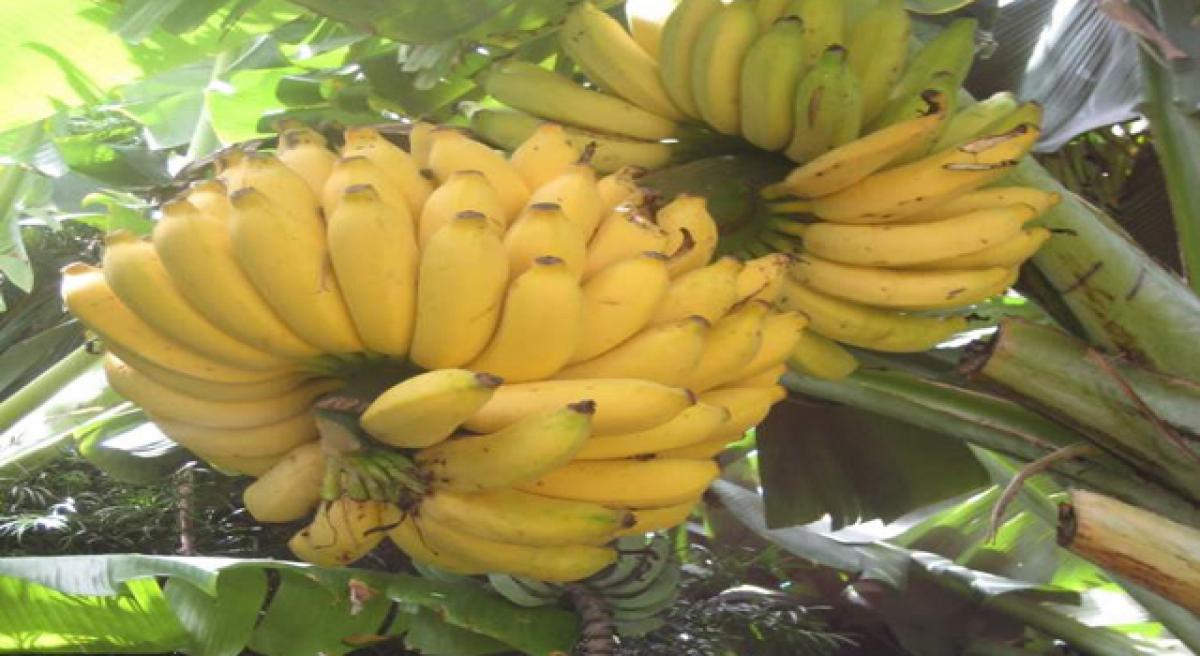Live
- MacBook Air M3 Hits Lowest Price in India: Find Details
- High Court Adjourns Hearing on Allu Arjun's Petition to 4 PM
- Pawan Kalyan praises Chandrababu Naidu at Swarnandhra Vision 2047 document launch
- Chirec International looks to transform education with Chirec 2.0 vision
- Telangana CM Revanth Reddy Responds to Allu Arjun's Arrest in Delhi
- Uddhav Thackeray to PM Modi: Pay attention to Bangladesh, act to end Hindus’ misery
- Allu Arjun Arrested: KTR Reacts on X, Calls Arrest Unfair
- Bold steps by Modi govt in reviving Indian heritage, culture: Union Minister
- What are the charges against Allu Arjun: Understanding the Charges Against Him
- Allu Arjun Objects to Arrest Procedure, Requests Breakfast and Change of Clothes
Just In

Bananas - one of the world\'s top five staple foods - may become extinct in just five to 10 years due to fast-advancing fungal diseases, scientists have warned.
Los Angeles: Bananas - one of the world's top five staple foods - may become extinct in just five to 10 years due to fast-advancing fungal diseases, scientists have warned.
The threat could be coming from something called the Sigatoka complex, made up from three fungal diseases, which pose a huge risk to the world's banana supply.
Researchers at the University of California - Davis in the US and in the Netherlands discovered how this group of three closely related fungal pathogens evolved into a lethal threat to the world's bananas.
The Sigatoka complex is made up of three fungal diseases — yellow Sigatoka, eumusae leaf spot and black Sigatoka. Of the three, black Sigatoka poses the greatest risk to the 100 million tonnes of bananas grown annually in almost 120 countries.
To understand how the fungi attack, the researchers sequenced the genomes of eumusae leaf spot and black Sigatoka, and then compared results with the previously sequenced yellow Sigatoka genome.
What they found was the three fungal diseases not only shut down the immune system of the banana tree, but the metabolism of the fungi also adapted to match that of the host plant.
This means the fungi can produce enzymes to break down the plant’s cell walls to feed on its sugars and other carbohydrates. The fungi adapt to match that of the host plant.
“We have demonstrated that two of the three most serious banana fungal diseases have become more virulent by increasing their ability to manipulate the banana’s metabolic path ways and make use of its nutrients,” they said. “This parallel change in metabolism of the pathogen and the host plant has been overlooked until now and may represent a ‘molecular fingerprint’ of the adaptation process.
It is really a wake-up call to the research community to look at similar mechanisms between pathogens and their plant hosts.”
They pointed out Cavendish bananas — those most commonly found in the supermarket — are grown from shoot cuttings, which means a disease capable of wiping out one plant could destroy them all.
“The Cavendish banana plants all originated from one plant and so as clones, they all have the same genotype — and that is a recipe for disaster,” they said.
In order to prevent the global banana industry from being wiped out in the next decade, farmers need to make 50 fungicide applications to their banana crops annually.
“Thirty to 35 per cent of banana production cost is in fungicide applications,” they said. “Because many farmers can’t afford the fungicide, they grow bananas of lesser quality, which bring them less income.”
In 2001, Australia’s largest banana production area - Tully in far north Queensland - was close to extinction after Black sigatoka was discovered.
An intense de-leafing programme was undertaken for the entire production area within a 50-kilometre radius. Additionally, Tully growers conducted a weekly aerial spraying campaign, covering some 4,500 hectares.
In 2003, a team of scientists confirmed a world-first had been completed, with the Black sigatoka being completely eradicated. However, as this complex is made up of three fungal diseases, it might not be so easy to destroy.

© 2024 Hyderabad Media House Limited/The Hans India. All rights reserved. Powered by hocalwire.com







